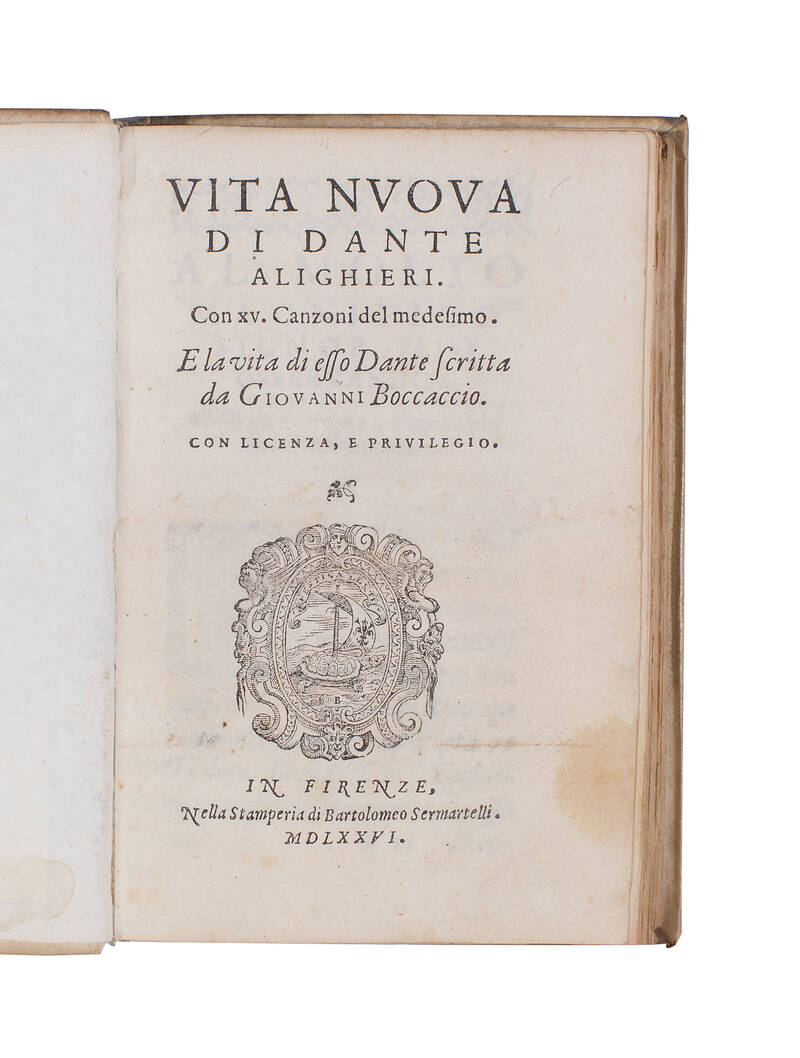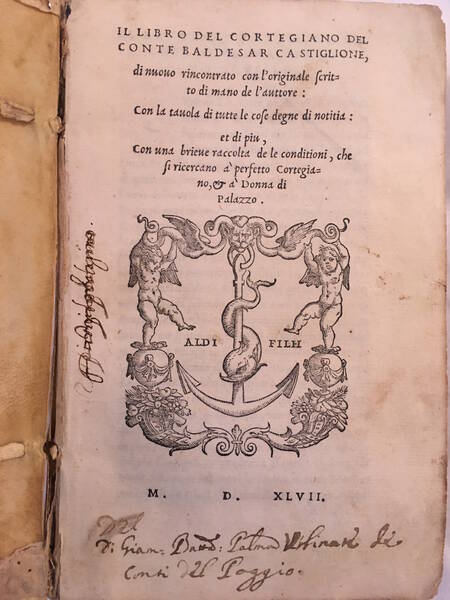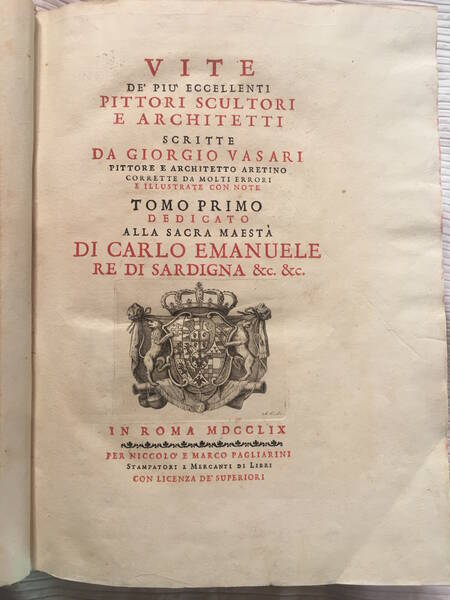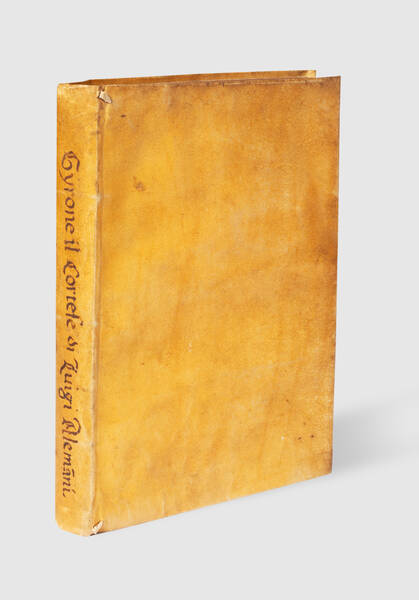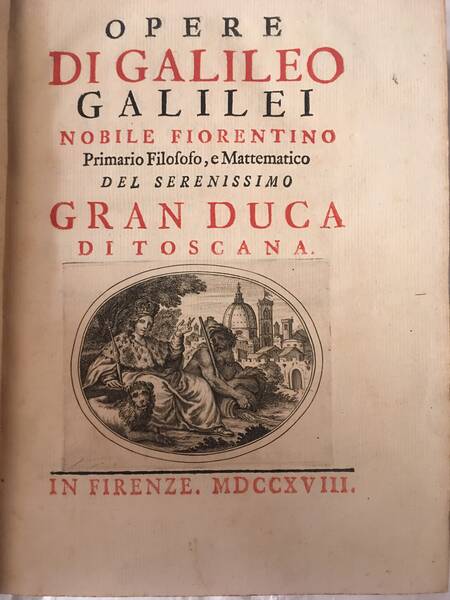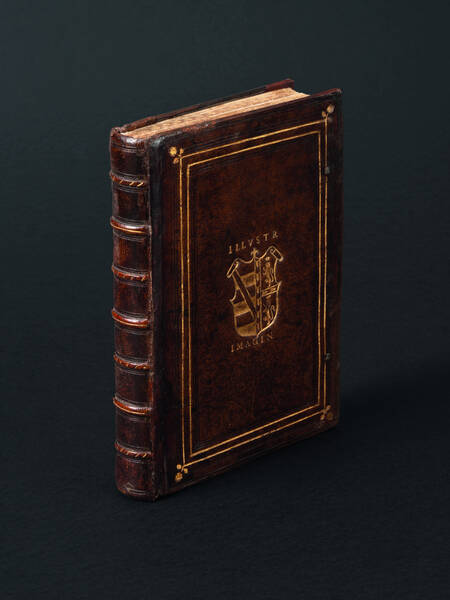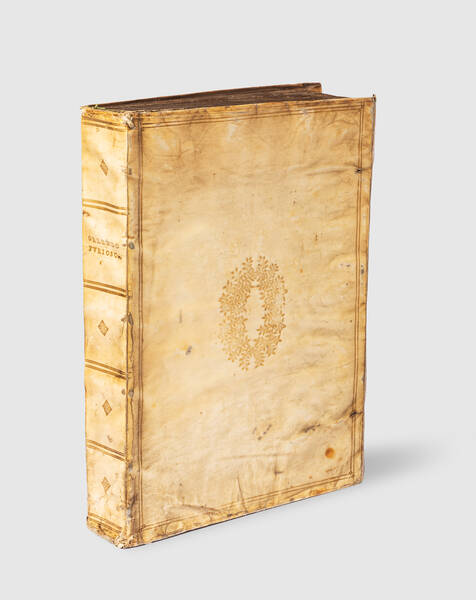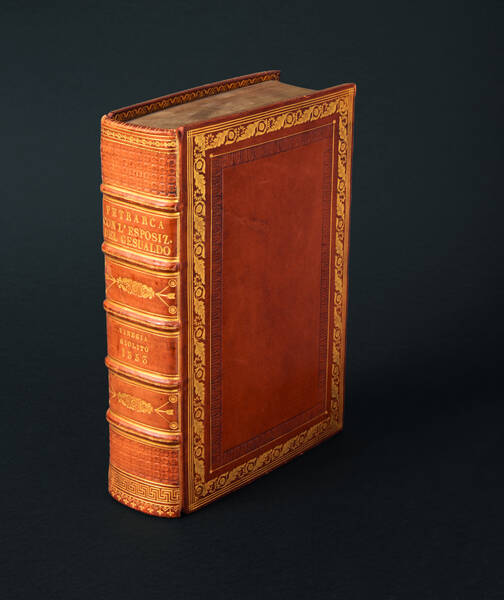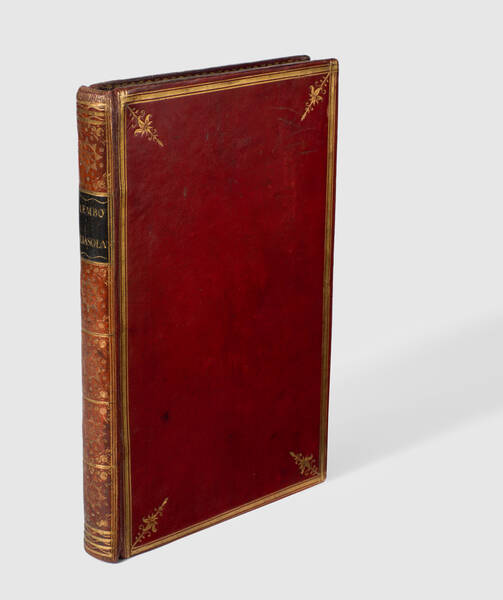ALIGHIERI, Dante. Vita nuoua di Dante Alighieri. Con XV canzoni del medesimo. E la vita di esso Dante scritta da Giouanni Boccaccio
Florence, Bartolomeo Sermartelli., 1576.Octavo (161 x 105 mm.), two parts in one volume: [8], 116, [4] pages; 80 pages with woodcut printer's device on both title-pages. A small spot in the white margin of the first leaves but a very good copy in XVIII century stiff vellum, with two red morocco lettering pieces on spine sligthly chipped, from the Pesaro Libray and after 1805 in the possession of Thomas Jones at Hafod, Cardiganshire.
First edition, very rare.'Written between 1293 and 1294, the Vita Nuova is dedicated to Dante's “first friend”, his primo amico, Guido Cavalcanti. The author presents it as an anthology of his early poems, framed within a prose commentary which not only guarantees narrative structure and progression, explaining and revealing the circumstances which inspired the poems, but also functions as a detailed commentary on the 31 poems selected. Structurally, the work is arranged as a diachronic prosimetron, an alternation of prose and poetry (although it seems highly likely that some of the poems were written at the time of the commentary itself), the first of its kind in Italian literature, modelled on Boethius' De consolatione Philosophiae, ascribed in Medieval times to the elegiac genre, to which, as has recently been suggested, Vita Nuova could also belong. In highly idealized and almost hagiographic terms, the narrative traces the story of Dante's love for Beatrice, whose portrayal is highly bound up with the imagery of Christ. The story, however, is based not so much on external events but relates the protagonist's spiritual renewal. His feeling of love is at first a self-centred need, as in the courtly tradition, for his devotion to be rewarded, but then evolves into detached praise for his beloved as the only kind of reward needed to satisfy his desire. The turning point, marked by Donne ch'avete intelletto d'amore, the canzone-manifesto of Dante's stilnovo, is reinforced by Beatrice's death, an almost required condition of genuine, selfless love. The book ends with the promise that he will not speak of Beatrice again, until he is able to “write about her what has never been written of any woman”. The Vita nuova is not only a story of love and spiritual renewal, but also a (highly subjective) means by which Dante takes stock of his own literary career: in other words, the outline of a dual, parallel evolution, in poetry as well as in sentiment.' (internetculturale.it) ‘In the Vita Nuova, Dante—as is universally recognized—gave to the West a myth whereby the love of woman could lead to the love of God. And the arrival at the love of God no longer required the recantation of the love of woman, as it formerly had in Christian thought. By drawing an analogy between Beatrice and Christ, by terming her a “miracle,” by allowing her to participate in the “three-ness” of the Trinity, Dante could transmute his proper function as a lover into a forsaking of possessiveness in favor of an outpouring of praise, trusting that her virtute would lead to his salute. When he repeats the rhyme—a common one—of salvation with virtue, Dante (by his literary power) “guarantees” their connection. The salvation of Dante-the-pilgrim has already occurred when Virgil, who has accompanied Dante through Hell and Purgatory, yields his role as guide to Beatrice. Dante hears from Beatrice, now unveiled, one of the most shining lines of reward in literature: “Guardami ben: io son, io son, Beatrice.” (“Look on me well: I am, I truly am, Beatrice.” At the heights of Paradise, her poet speaks to her for the last time. As Longfellow pointed out, this is the only moment in the Commedia when Dante addresses her in the familiar “tu”: “Tu m'hai di servo tratto a libertate.” (“You have drawn me out of slavery to freedom.”) As the poet praises Beatrice for leading him to liberty, the rhymes take on their wonted“guaranteeing”: salute/vedute/virtute; bontate/libertate/potestate.The Vita Nuova has left many rhetorical and thematic legacies to Western poetry—the disturbances and vacillations of possessive love, the eye as the erotic organ par excellence,the refinement of the mixed genre of prose and poetry, the symmetry of the arrangement of the poetic sequence, the drama of direct address to a beloved, the power of simplicity in language in poems of complex interiority—and for all these bequests the Vita Nuova will continue to be remembered and debated. In their original Italian, the poems will be memorized, pondered, and loved.' (Helen Vendler, The Road to Paradise. The New Republic. October 25, 2012)
Mambelli, Annali delle Ed. Dantesche, 663; Gamba, 414; Brunet I, 1018.
Other Books
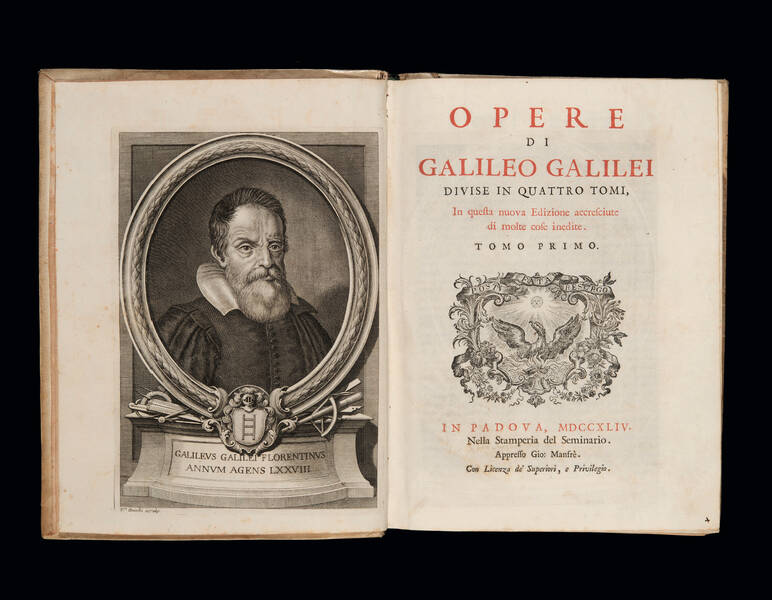
GALILEI, Galileo
Opere, divise in quattro tomi, in questa nuova edizione accresciute de molti cose inedite.
SOLD OUT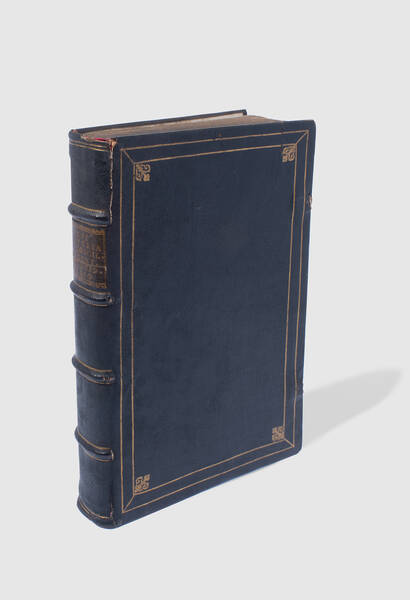
SARPI, Paolo
Historia del concilio tridentino di Pietro Soave Polano. Nella quale si scoprono tutti gl'artificii della Corte di Roma, per impedire che né la...
SOLD OUT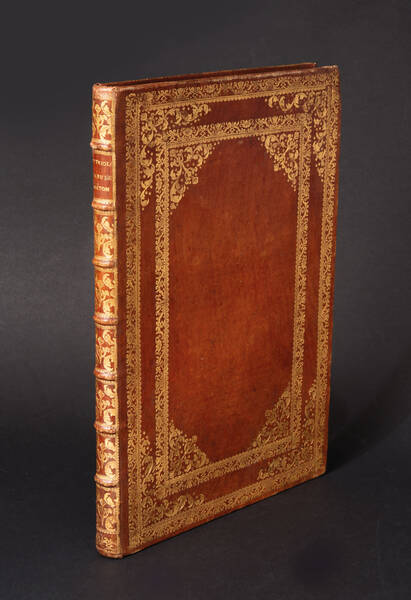
BERRETTINI DA CORTONA PIETRO
Tabulae Anatomicae a celeberrimo pictore Petro Berrettino Cortonensi delineatae, & amp; egregiè aeri incisae nunc primum produent, et a Cajetano...
SOLD OUT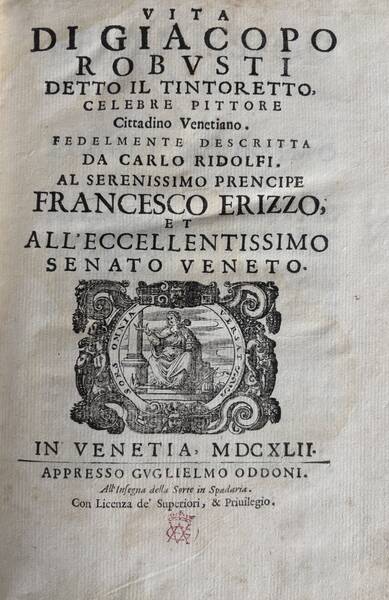
RIDOLFI, Carlo
Vita di Giacopo Robusti detto il Tintoretto, celebre pittore, cittadino venetiano.
€ 2.500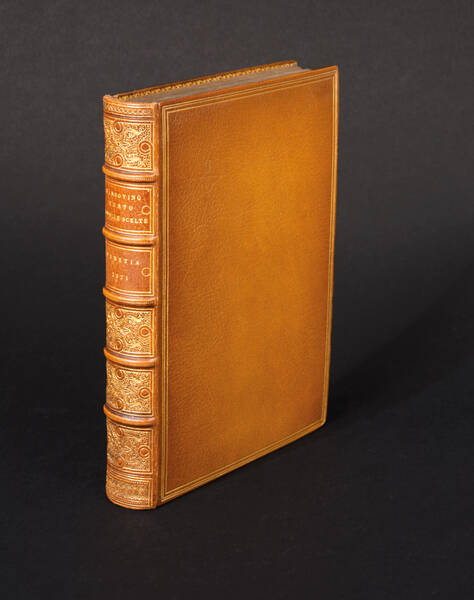
SANSOVINO, Francesco
Cento nouelle scelte da piu nobili scrittori della lingua volgare, con l'aggiunta di cento altre nouelle antiche, non pur belle per inuentione, ma...
€ 3.600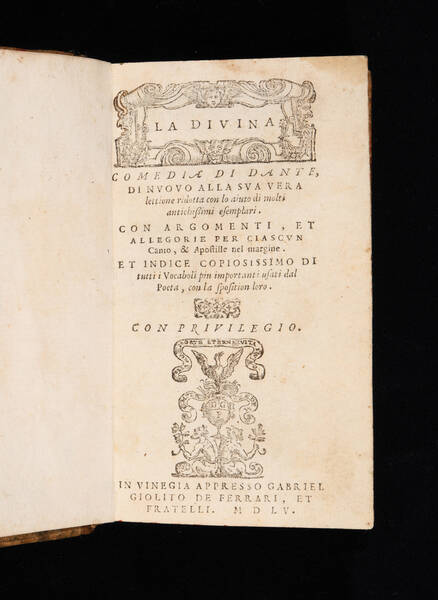
ALIGHIERI, Dante
La Diuina Comedia di Dante, di nuouo alla sua vera lettione ridotta con lo aiuto di molti antichissimi esemplari. Con argomenti, et allegorie per...
SOLD OUT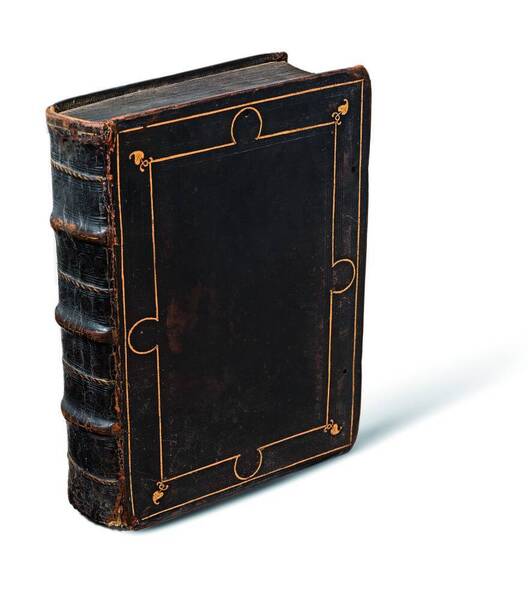
PLINIUS
Historia naturale di C. Plinio Secondo di latino in volgare tradotta per Christophoro Landino, nuouamente in molti luoghi, doue quella mancaua,...
SOLD OUT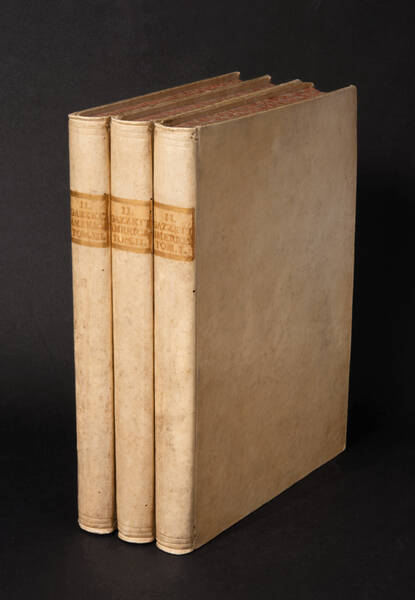
GAZZETTIERE AMERICANO
Il Gazzettiere Americano, contenente un distinto Ragguaglio di Tutte le Parti del Nuovo Mondo.
SOLD OUT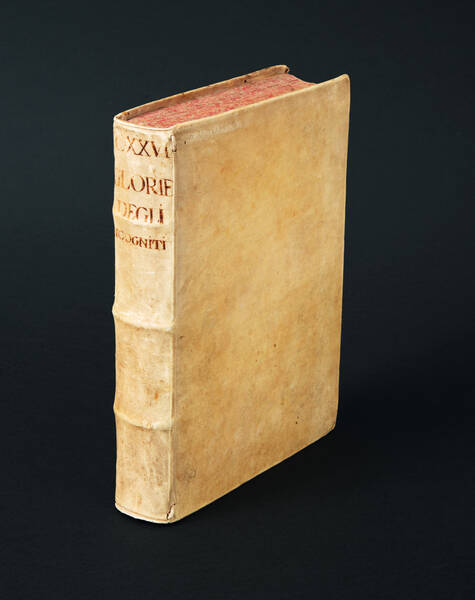
[BRUSONI, Girolamo]
Le glorie de gli Incogniti o vero gli huomini illustri dell'Accademia de' signori Incogniti di Venetia.
€ 8.000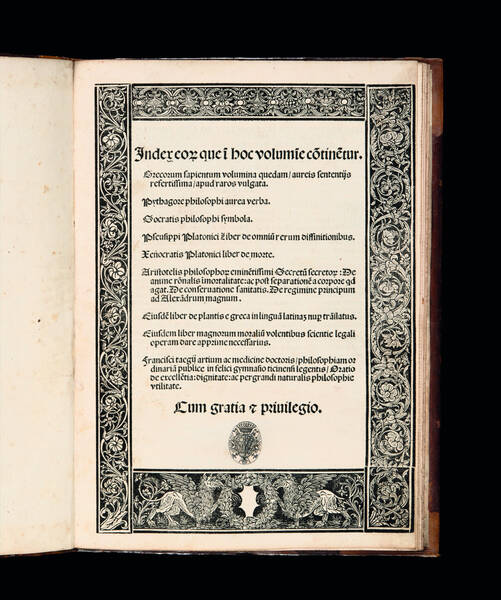
TAEGIO, Francesco
Grecorum sapientum volumina quedam aureis sententijs refertissima apud raros vulgata. Pythagore Aurea verba. Socratis Symbola. Pseusippi Platonici...
€ 12.000MEDA RIQUIER rare books ltd.
4 Bury Street St James's
SW1Y 6AB London
Phone +44 (0) 7770457377
info@medariquier.com
